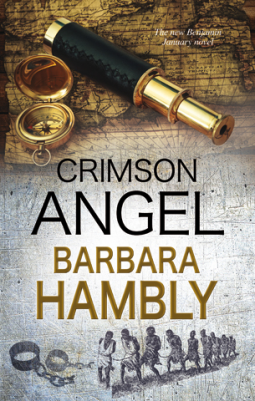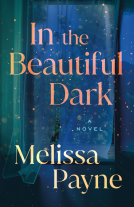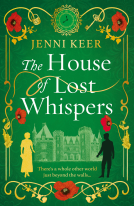
Crimson Angel
A Benjamin January historical mystery set in New Orleans and Haiti
by Barbara Hambly
This title was previously available on NetGalley and is now archived.
Send NetGalley books directly to your Kindle or Kindle app
1
To read on a Kindle or Kindle app, please add kindle@netgalley.com as an approved email address to receive files in your Amazon account. Click here for step-by-step instructions.
2
Also find your Kindle email address within your Amazon account, and enter it here.
Pub Date 1 Dec 2014 | Archive Date 31 Dec 2014
Description
When Jefferson Vitrack – the white half-brother of Benjamin January’s wife - turns up on January’s doorstep in the summer of 1838 claiming he has discovered a clue to the whereabouts of the family’s lost treasure, January has no hesitation about refusing to help look for it. For the treasure lies in Haiti, the island that was once France’s most profitable colony – until the blood-chilling repression practiced there by the whites upon their slaves triggered a savage rebellion. The world’s only Black Republic still looks with murderous mistrust upon any strangers who might set foot there, and January is in no hurry to go.
But when Vitrack is murdered, and attempts are made on January’s wife and himself, he understands that he has no choice. He must seek the treasure himself, to draw the unknown killers into the open, a bloody trail that leads first to Cuba, then to Haiti, and finally to the secret that lies buried with the accursed gold.
A Note From the Publisher
We will consider requests from established bloggers, Acquisition and Collection Development Public Librarians and booksellers in the UK and USA.
Available Editions
| EDITION | Other Format |
| ISBN | 9780727884275 |
| PRICE | US$34.99 (USD) |
Average rating from 19 members
Featured Reviews
 Reviewer 153322
Reviewer 153322
Benjamin January, free man of color and Paris-educated surgeon and classical pianist is trying to weather the Panic of 1838 in New Orleans by lying low with his wife Rose and new baby. Since this is a series mystery, however, he is dragged into a generational scandal going back to the white planter branch of Rose's family in Santo Domingo, where their association with a vivisectionist French doctor and buried treasure threatens to reopen secrets hidden since the 1791 revolution. Hambly is very good with using January to explore the intricate relationships and fears of 1830s southern racial relations--the boorish American police commander from Kentucky, the highly evolved system of placage and January's quadroon sister, dark-skinned sons sent off to European and northern colleges, poor white marginal people like itinerant Irish violinist Hannibal Sefton, Native American Creek and Cherokee people trying to hold on to their lands in Georgia and Alabama, and uneasy creole politicians with enough mixed-blood to cause scandal.
 Christine E, Reviewer
Christine E, Reviewer
Disclaimer: ARC read via Netgalley.
Barbara Hambly’s work is something that goes back with me. From her twist on a dragon story to impassioned defense of puntable dogs, she is a great writer. Her historical fiction, however, is usually better than her fantasy fiction. Crimson Angel is an entry in the Benjamin January Series, in which the title character is a freed black man who has trained as a surgeon, but who lives in New Orleans post-LA purchase.
While this is well into series, it isn’t fully necessary for a reader to have read the other books in the series. Hambly, unlike many authors, gives just enough back story to inform new readers without boring old fans. Few authors know how to do this, and it is wonderful to see an author do this skillfully.
January and Rose his wife find themselves caught up in mystery surrounding Rose’s family and a possible treasure. Together with long time friend Hannibal, the couple is forced to travel outside of the United States to solve the mystery and ensure their safety and that of their young son. The mystery, as most of the mysteries in this series, is a combination of gothic as well as mystery. While the plot is not repetitive, January’s forced travel to unsafe places, Haiti in this case, isn’t, and one wonders if January himself is concerned about this tendency of his.
The use of the dangerous situation/place might be slightly over done in this series, but it does allow Hambly to illustrate the historical time as well as present the horror/inhumanity/wrongness of slavery. This is done not only though the use of January as a child of slaves whose master determined to education him, but also by his relationship to his mother, sisters, his wife, and his wife’s family. Hambly makes a distinction between French Orleans and American Orleans with the difference in society and its treatment of the disenfranchised and enslaved members. Furthermore, January will compare his reaction to something as opposed to his brother-in-law’s. The pain that January feels because his need/desire to protect his family is hampered by his status in an unjust society is stunningly illustrated.
But the theme that draws attention is the difference in perspective.
It’s true that Hambly could not have known about the latest flashpoint, Ferguson, but the analysis is apt and important. John Oliver was correct when he stated that it is impossible to live in the world and not be aware that race is always there, everywhere. To disregard that two segments of the population can see the police or government in two different ways is dangerous and, quite frankly, something that should inspire severe introspection. What Hambly does though the character of January is example and showcase how the dominant culture/race/gender can view one thing and how the repressed culture/race/gender does. It’s why the release of the video of Brown seeming to commit a crime is non-point, but the police did not, or while the claims of a racially diverse police department in Fergusson sound so stupid.
In other words, and I’m not expressing this well at all, while the mystery in this novel is easily figured out, while the plot might be too gothic for some, the use of race and perspective is beautiful, making the novel, and the series itself, worth reading.
 Patty B, Reviewer
Patty B, Reviewer
Crimson Angel, by Barbara Hambly, is the thirteenth and latest book in the Benjamin January mysteries. Like all of the books in this series, you could read it without having read the others. However, it's a much better book if you come into it knowing who the characters are, their relationships, and their backstories.
In New Orleans in 1838, Benjamin January and his wife Rose are doing well enough despite a nation-wide financial disaster. They're visited by Rose's half-brother, who is convinced that old rumors of a treasure buried on their family's long-abandoned sugar plantation on Haiti are real, and he wants the Januaries to come with him to find it. Ben does not approve of this plan:
Jefferson Vitrack was a white man, and so January refrained from saying, "That’s the stupidest idea I’ve ever heard."
Instead he simply said, "No."
"Your journey would not go unremunerated," Vitrack hastened to assure him. "Whatever we find, you will be entitled to half of it for your trouble. I understand it’s a dangerous undertaking, particularly as you would be going into Haiti alone. As a white man, it would be impossible for me—"
"And as a black man," finished January gently, "the moment I set foot in Cuba, I would be at extreme risk of being kidnapped and shipped as a slave either back to the United States – where I promise you, nobody is going to ask if I’ve been enslaved illegally or not – or more likely to Brazil. The danger would be ten times worse for Rose."
But despite Ben's efforts to avoid any adventures, things quickly begin to go wrong: strange men spy on the January house, Vitrack is killed, and Rose is attacked in the marketplace. Ben and Rose flee first to her childhood home on Grand Isle in southern Louisiana, but when they're followed there too, they decide that the only way to survive is to figure out the truth behind the stories about the treasure. They dig into the history of Rose's (incredibly complicated) family tree, as well as rumors of an evil "Dr Maudit", who may or may not be fictional, but who seems to somehow be connected to whatever happened back in 1791. But solving the mystery requires them head to Cuba, eventually ending up on Haiti itself. They take along their white friend Hannibal Sefton for protection and cover: he poses as their "master", Rose as his concubine, and Ben as his valet, a disguise which is less fraught than it has been in previous books, and which they mostly treat as a joke (their interactions are so great throughout the whole book. I adore their friendship):
"I met a woman in the tavern, fell in love, and married her," reported January. [...] "I hope you don’t mind?"
Rose assumed an expression worthy of Sarah Siddons at her most tragic, put a hand to her forehead, and collapsed into January’s arms.
"Now see what you’ve done," said Hannibal mildly, and he felt the side of January’s coffee pot to see if the contents were still drinkable. "And me without smelling salts." The cook’s youngest daughter appeared momentarily in the archway that led to the traspatio, then darted off, to fetch two more cups.
Rose sat up on January’s knee. "I have a good mind not to tell you about Don Demetrio."
"My new wife was tragically run over by a railway train."
"That’s better."
I loved this book. It has a slow start, and I'm not sure changing locations so many times helped it, but there were so many wonderful elements. And everything that happens after they arrive on Haiti is AMAZING (I want to go into detail, but I think it might be better to leave it unspoiled; suffice it to say that if you ship Ben/Rose/Hannibal, it's excellent). As always with this series, there are elements of fun adventure novels: Kidnappings! Cross-dressing! Disguises! Secret messages in obscure languages! Voodoo! Dramatic gun battles! But there's also always a serious consideration of ethics and the historical setting. This time Hambly focuses on slavery, specifically as it was practiced on Haiti, and the country's difficult history during and after the revolution. The themes of the book are pretty much perfectly summed in this scene near the end:
He looked up and saw Hannibal watching him with those quiet dark eyes, bruised with fatigue and blacker than any coffee he’d ever seen. "Why does it bother me?" he asked softly.
"Because it should"’ the fiddler replied. [...] "I’m sure Rose’s esteemed great-grandfather would have claimed that he needed his birthright just as badly. The law proclaims that it is wrong to keep the profits of a crime, not out of spite toward the guilty, but because keeping the proceeds is an incentive – a permission – for others to commit crimes for the sake of the rewards. And it is perilously easy to commit crimes against the helpless. This island was built on them."
An excellent book, and highly recommended.
ARC read via Netgalley.
 Doreen Q, Media/Journalist
Doreen Q, Media/Journalist
Barbara Hambly has been one of my favorite authors since the 1980s. I discovered her in the Fantasy realm and devoured all of those novels. In 1998, she wrote a historical mystery called A Free Man of Color, about a free black man living in New Orleans during the early 1830s. I read it and was immediately hooked – she started my interest in mystery novels. Crimson Angel is her 13th novel about Benjamin January, a skilled pianist and a Paris-trained physician who solves mysteries in his spare time. This novel focuses on a secret in his wife’s family, one for which someone is willing to kill. One of Rose’s two white half-brothers comes seeking Benjamin’s help in searching for a secret treasure in Haiti, left behind when the slaves rose up in rebellion and killed or drove out all the white planters. Although Benjamin initially declines to help him because of the dangers involved in traveling to Haiti, the brother is murdered, and someone attempts to kill Rose. It becomes obvious that in order to protect Rose and their son, Benjamin must find the mysterious treasure before the killer does. Hambly excels in her vibrant descriptions and the minute details that she puts into her works. The language is lyrical and almost poetic. In addition, the historical minutiae that she includes are evidence of the intense research Hambly must have done. I wish that high school history classes would teach from these types of books rather than the boring texts that I remember. During the course of the novel, Hambly describes some of the casual atrocities of slavery as well as the relationships that exist between races and within families; however, she does so simply through the telling of her tale, rather than addressing it directly. Although this is the continuation of a lengthy series, anyone could pick this novel up without having read any of the preceding ones. Hambly does an excellent job of giving enough background information without setting it aside in a prologue or explaining it through dialogue. One simply starts the novel and is immediately immersed into the politics of the French Orleans and the American Orleans, the interactions between masters and slaves, and lastly the everyday life of traveling during the first part of the 19th century. At the end of the novel, Benjamin is faced with a horrific moral dilemma – to say more would spoil the story. The decision he is forced to make was extremely difficult, and I am not sure that I would have been able to do the same. I came away from the book questioning my own values, and I am still amazed at how Hambly was able to invoke such thoughtfulness so obliquely. Needless to say, I cannot wait for her next novel. I eagerly search her website for short story scraps that continue the adventures of characters that she wrote about over 30 years ago. I cannot recommend her writing enough.
 William B, Reviewer
William B, Reviewer
Benjamin and Rose January are back in a new adventure. The evils of slavery and greed are the major themes in this book.
Rose's past intrudes on the life that Rose and Ben are trying to build. Rose's brother brings the Crimson Angel into their life and that leads down a path of death and destruction. The mystery of the evil Dr. Maurir is defined by his similarity as an early rendition of the equally evil Nazi Mengle with a similar penchant for experimentation on live subjects.
Hambly very graphically illustrates the often ignored atrocities that accompanied slavery. She also points out the astounding number of deaths that also accompanied slavery. If nothing else, this book hammers home the dreadful impact of slavery on both the slaves and the destruction of character in the slave owners.
This is a good story with a very impactful depiction of slavery.
I recommend.
 Waheed R, Reviewer
Waheed R, Reviewer
In 1838 New Orleans, Benjamin January, a freed slave and Paris-trained surgeon, is having to survive as a musician. However, life takes a turn for Benjamin when his wife Rose’s white half-brother, Jeoff, comes calling with an offer to participate in a treasure hunt. He claims to have discovered clues to his family’s heirlooms hidden at their former estate in Haiti; the family had had to flee the island following the slaves’ bloody uprising. Benjamin is reluctant to accept Jeoff’s proposal. However, when Jeoff is mysteriously murdered and Rose is attacked, Benjamin enlists the help of a white fellow musician friend. To resolve matters, they embark on a trip that takes them to Grand Isle, Cuba, and Haiti.
Although the thirteenth novel of Barbra Hambly’s series, this reads like a standalone, for all the necessary backstory is dexterously interwoven. The story’s historical antebellum period is portrayed vividly. The delicate race relations are dramatized like in a screenplay. Benjamin’s skills, not only as a physician but also as a scholar, are amply demonstrated. For instance, when he is washed ashore in Haiti, he appropriately recites Shakespeare: “What country, friends, is this?” Furthermore, the mystery aspects of the plot will keep readers engrossed up to the end.
This review first appeared in the HNR Issue 71 (February 2015)






